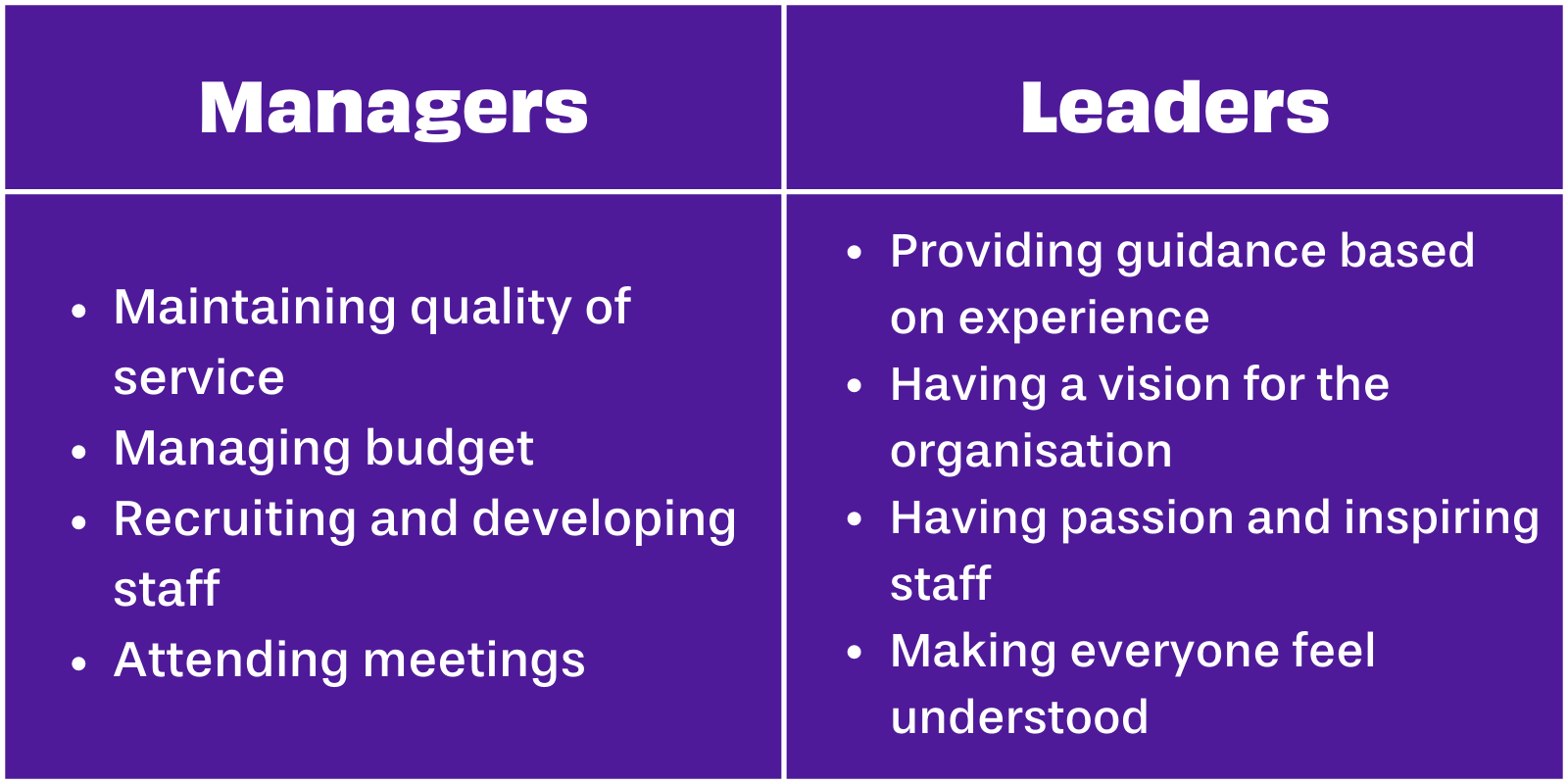Managers and leaders also have very different roles when it comes to change. Managers cope with the results and complexities of change. Leaders initiate change. They see how things could be better and motivate others to turn that vision into reality.
With the sudden implementation of remote and hybrid working, managers and leaders had to quickly adapt to how they can motivate their team. We held a webinar ‘Pivoting in Leadership: a New Path to Resilience’. In the sessions we discussed practical insights on how we can PIVOT leadership to build organisational resilience. Wondering what PIVOT stands for? Give it a listen!
Tips to get promoted into a leadership or management role
Even if you don't feel ready, the likelihood is that the job you have now already calls for both management and leadership skills–and you’re great at both. And what you don't know already, you can learn on the job. All great managers and leaders have to start somewhere.
"My first managerial role was the management of one person in a small safety team," says our good friend Jonathan Jones, who's now Corporate Director of Assets & Property at the Cardiff Community Housing Association.
"I had completed an ILM Level 3 qualification in first line management a few years previous but still didn’t feel prepared to take on a managerial role. And to make it more difficult, I had worked closely alongside this colleague for four years.
"But I didn’t give up when it became difficult, I persevered, developing my managerial skills, and three years later went on to lead the department.
"A lot of self-learning, a brilliant mentor, supportive (and unsupportive 😉) colleagues and hard work got me to where I needed to be. Over the next few years, I realised that I loved working with and influencing lots of different people. Supporting, leading and developing people really excites me."
But how do you make yourself a candidate for promotion? Here are ten steps that could get you promoted.
1. Set and Communicate Career Goals
At the start of the year, sit down with your boss to discuss and set your next steps. This will demonstrate that you’re goal-oriented–especially if you actually achieve your goals. That means you’ll need to do the homework. Compare the skills you have with those required for the leadership or management role you want, and work out what you need to develop.
2. Find a Mentor in Your Organisation
A mentor is different from an executive coach. A coach can help you do a big-picture review and an overhaul of how you work. Mentors help you with specifics. They’ve gone through the experience themselves and give you the benefit of their experience. A mentoring relationship can be much more short-term than coaching.
“Reach out to someone you admire and trust within your area of interest and ask to have a conversation about their journey into their current position. Ask if they would mind sharing some advice, or potentially be an informal mentor you can ask advice of. Shadow people in their day to day job roles to get a better understanding of the sector as a whole,” suggests Rachel Honey-Jones, Head of Community Regeneration at Cymdeithas Tai Newydd Housing Association.
Jonathan adds, "I was very lucky to find a fantastic mentor who has shaped me into the person and leader that I am today. This person saw something in me and didn’t use the mentoring as a means to further their own career. She still plays a huge part in my life and career goals today. I have taken the same approach to mentoring and have supported some great people to achieve their goals. I’m really proud of what they have achieved and will do in the future.
"When considering looking for a mentor, choose someone that has similar core values as you and someone that inspires you – just because someone has all the technical qualifications or experience it doesn’t make them a good mentor. It's OK to be “picky” with who you choose, as they will develop you and the skills/approaches that you take to situations in the future.
"Don’t be afraid to work on areas where you are weaker and haven't developed yet (whatever they may be). Look at getting a coach who can support you with these blind spots, as this helped me with my transition into an executive role. Everyone spends a lot of time working on areas where we have natural ability or tendencies and can often neglect our weaker areas. Don’t ever be afraid to ask for help – it's not a sign of weakness, it's actually very brave."
3. Show You’re a Team Player
Evidence your excellent team player abilities. Don’t just volunteer for extra responsibility at work, show enthusiasm for taking responsibility and making a difference in your personal life too, maybe through volunteering or your involvement with a community project.
"Be ready to support your team," says Jonathan. "When you manage and lead, it's no longer all about you. It's about how you support other people to be brilliant and contribute to team goals. Leading and inspiring people is completely different from being good at your job in a technical role – you’ll progress as your team collectively succeeds."
4. Become an Expert
Build your personal brand as an expert in a particular area. Become the go-to person for something in your team, whether it’s graphic design or handling difficult customers. You’ll stand out as a natural candidate for promotion because people are always seeking you out.
5. Keep Learning
Show your commitment to continuing education by finding learning opportunities both in your workplace and outside it. This proves that you’re serious about your career. Speak to HR or learning and development about potential training courses. There are many online courses, offered by sites such as Skillshare and Coursera.
"From early on in my housing career, personal learning and development played a huge part in where I find myself today," says Jonathan. "I didn’t go through the traditional route for early learning – such as GCSEs, A Levels, University. I work within an Executive Leadership Team where we have not completed the traditional higher education route – hard work, dedication and striving to be the best we could be be got us to where we wanted, picking up qualifications and skills along the way.
"I have always enjoyed self-learning much more than most others would and still spend late evenings and early mornings reading and learning about all sorts of things. Many years ago there was a time that I would nod along in meetings where I didn’t understand the topic areas and most of the time felt out of my depth. I made a point to go home that evening and learn all about that area, and when that subject came up again in the future, I would be ready, prepared and know a lot more about the area than colleagues discussing it. That has served me very well and built up my confidence to contribute in all types of situations.
"If you don’t understand something, it's so important to ask a question or to learn more about yourself so you are not in that same situation again. And if you are not sure about how to overcome a managerial issue, ask for help… it's OK to take support 😉"
6. Document Your Success
If you’re going to ask for a promotion, you need to be able to make a solid case. Be ready to show evidence of your progress, wins, and achievements, including quantifiable figures if you can. Rather than trying to think back through everything you’ve accomplished, keep a log of your successes as you go.
7. Be a Role Model
Try to act as a role model to others, avoiding office politics and bad habits like persistent lateness, and instead displaying trustworthiness, decisiveness, confidence and passion. Show that you’re willing to step up and take charge.
8. Network
Use every networking opportunity to promote yourself and your skills and to get to know people who can support you. This can be as simple as dropping a catchup email to a former colleague, but it’s also worth checking out events that are specifically designed for networking.
“Join our Chartered body, the Chartered Institute of Housing,” suggests Rachel. “The
new membership offer provides access to tons of free training and events, which will help you professionally develop, create a bigger network of people you know, and educate you in different areas of social housing. Many housing providers will pay for your membership, and if you are under 30 there are heavily discounted rates to make it affordable.
“If there is a steering group taking place, or a project group, try to join it, as if you are able to be a representative this will help enhance your knowledge on the business as a whole.
“Look for voluntary opportunities to expand your knowledge – can you volunteer in a food bank or a hostel?
“But the biggest one for me was joining a housing association Board – you are never too young to apply for these things, I was Vice Chair of one when I was 26! Just make sure that you research and understand governance of our sector, have a sound understanding of the political
climate and environment that we operate, bring all of your lived experiences to the table, and your operational knowledge of the issues facing tenants are really important to be heard at Board level.”
9. Ask Yourself What’s In It For Them
Organisations own jobs, people own their careers. If you want a promotion, you need to align it to the expectations of your manager and the organisation. That means asking yourself WHY you should be considered for a promotion, how you could add value in a leadership or management role, and then selling that idea to them.
10. Get Your Work-Life Balance Right
"Make sure you have a healthy work-life balance, but when in work, give it your all and work hard," says Jonathan.
"I have always found it difficult to 'switch my brain off', so I need something to help me wind down in the evening after work. I have always had something throughout my career that has kept me fit and my mind active – cycling, football, golf, running, quizzing, etc. This has helped me relax, and the activities take my mind off some of the aspects of life that you just need a break from sometimes 😊
"Right now, I’m fixated on the gym and lifting weights.
"In all these activities I always strive to be the best, give it my all and aim high in terms of my goals – and this is something that is embedded in me – if you are going to do something, commit to it and do
it the best you can, and see where it takes you.
"This is the same approach I take toward my working life and throughout
my career in housing."
Bonus: Do It To Better Yourself
"Don’t chase managerial positions because of money – do it for your own progression," says Jonathan. "In my career, I’ve never sought a promotion where chasing money was a factor. All the roles that I have had have been to better myself, and I thought that my skills could improve that organisation as a whole.
"My mentor told me years ago that if you work hard, take the opportunities, be bold and brave whilst helping people around you, the opportunities find you. I absolutely agree with this now more than ever!"
Conclusion
You know you have what it takes to be a manager–and you may already be a leader. Just follow these steps, and everyone around you will see it too.




